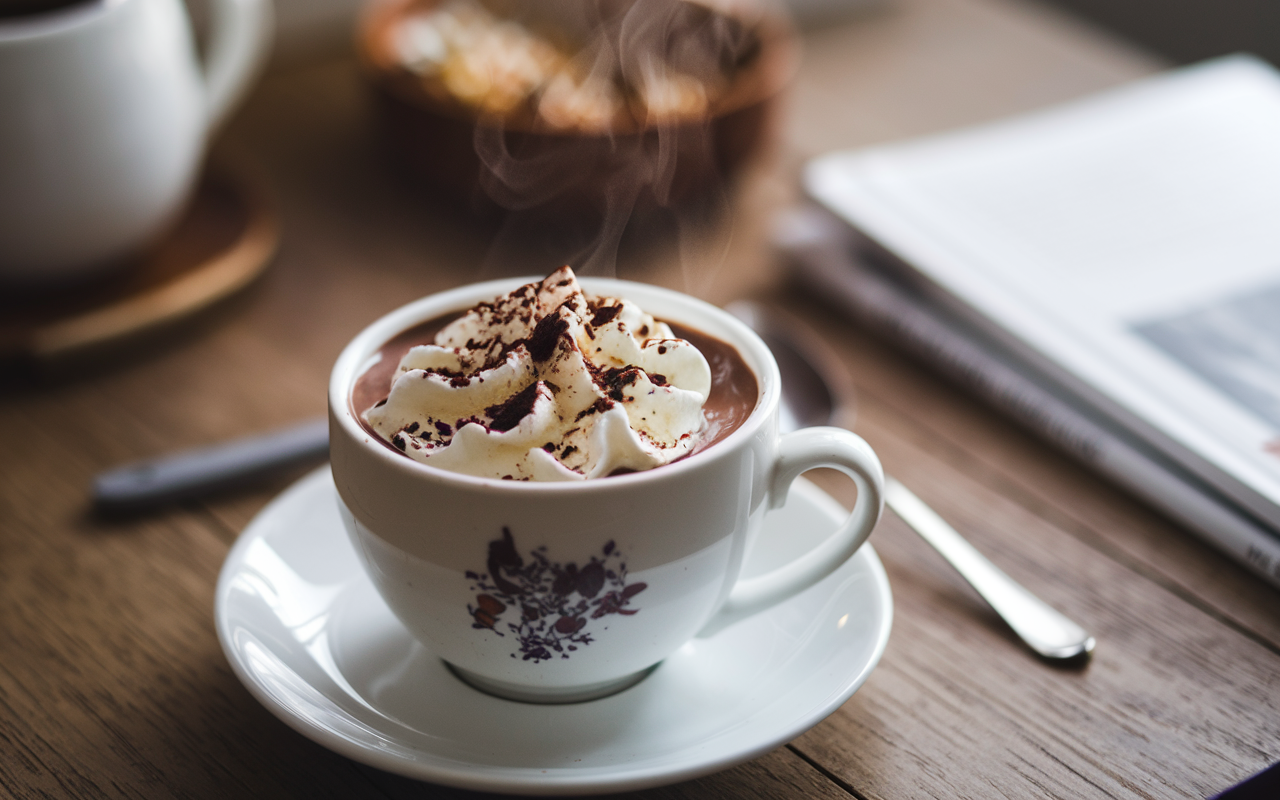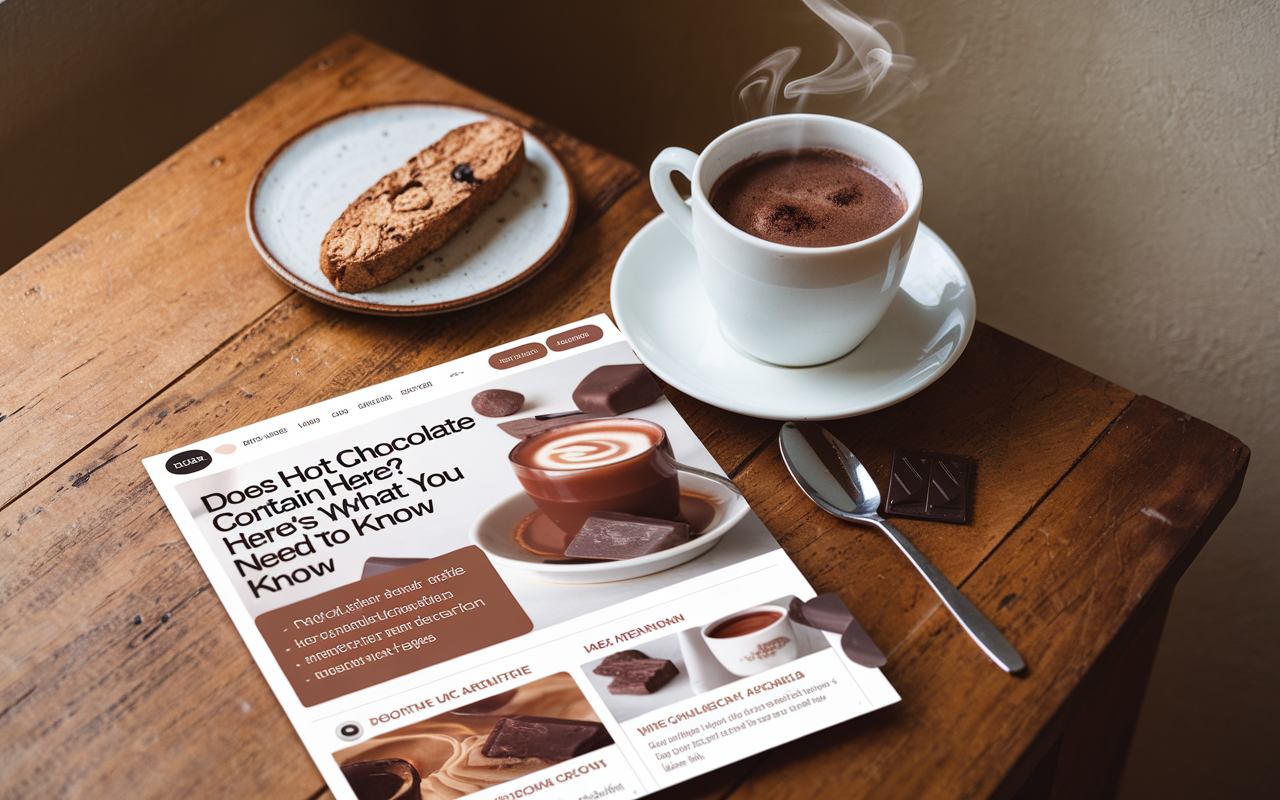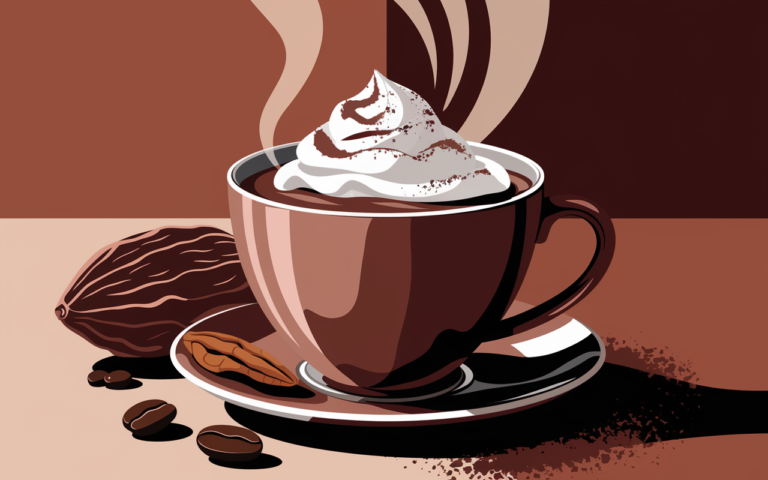Does hot chocolate contain caffeine: Hot chocolate is a beloved comfort drink enjoyed by all ages. Whether you’re cozied up by the fire on a cold winter night or indulging in a sweet treat during the day, this creamy beverage is irresistibly satisfying. But if you’re among the health-conscious crowd or simply monitoring your caffeine intake, you might be wondering—does hot chocolate contain caffeine? Let’s break it down.
Does Hot Chocolate Contain Caffeine:
Yes, hot chocolate does contain caffeine. However, the amount of caffeine in hot chocolate is generally much lower compared to coffee, tea, or even certain sodas. The exact caffeine content depends on the type and amount of cocoa used in your hot chocolate, as caffeine is naturally found in cocoa beans.
One serving of traditional hot chocolate made with cocoa powder or melted chocolate typically contains around 5–7 mg of caffeine per 8-ounce cup. For comparison, an 8-ounce cup of coffee can range from 80–100 mg of caffeine, and black tea contains about 40–50 mg.
Where Does the Caffeine in Hot Chocolate Come From?

The caffeine in hot chocolate comes directly from cocoa. Cocoa beans naturally contain compounds such as theobromine and caffeine, which are stimulants. But don’t worry—cocoa primarily contains theobromine, which has a more subtle and longer-lasting effect on the body compared to caffeine.
If you’re using instant hot chocolate mixes, keep in mind that additional ingredients, such as chocolate or coffee flavorings, might slightly increase the caffeine content. Always check the label if you’re looking for an exact breakdown.
Is the Caffeine in Hot Chocolate Harmful?
For most people, the small amount of caffeine found in hot chocolate is not harmful. A single serving of hot chocolate has significantly less caffeine than other caffeinated drinks, which makes it a great choice for individuals who are sensitive to caffeine or trying to cut back.
However, if you’re drinking multiple cups of hot chocolate a day or adding additional chocolate for flavor, you may find the caffeine content adding up. It’s also worth noting that kids can safely enjoy hot chocolate thanks to its minimal caffeine levels.
Benefits of Drinking Hot Chocolate
Hot chocolate isn’t just a caffeine-light alternative to coffee; when made with high-quality cocoa, it can also deliver a range of health benefits that make it more than just a comforting treat. Here’s why hot chocolate can be a fantastic addition to your wellness routine:
- Rich in Antioxidants
Good-quality cocoa is packed with flavonoids, a powerful type of antioxidant that supports heart health, brain function, and overall wellness. Flavonoids help reduce inflammation, improve blood flow, and may even lower blood pressure. Regular consumption of cocoa can also support your immune system and protect your cells from damage caused by free radicals.
- Mood Booster
Cocoa stimulates the release of endorphins and serotonin, the “feel-good” chemicals in your brain, which can help combat stress and improve your mood. This is why sipping a warm cup of hot chocolate can instantly bring comfort and joy, especially on a cold or challenging day. Some studies even suggest that cocoa may have long-term effects on improving mental health and reducing symptoms of depression.
- Mild Energy Boost
Thanks to the combination of caffeine and theobromine found in cocoa, hot chocolate provides a gentle, sustained energy lift without the jitters that coffee sometimes causes. This makes it especially ideal for afternoons or early evenings when you need a little pick-me-up to stay productive without disrupting your sleep later on.
- A Source of Key Nutrients
Beyond antioxidants, cocoa contains minerals like magnesium, iron, and potassium, which are essential for muscle function, maintaining energy levels, and heart health. If you prepare your hot chocolate with plant-based milk or dairy milk, you can also get additional nutrients like calcium and vitamin D.
When made with minimal sugar and high-quality ingredients, hot chocolate isn’t just a delicious indulgence—it can be a comforting, nutrient-rich addition to a balanced diet.
Tips for Making Healthier Hot Chocolate

If you’re looking to enjoy hot chocolate without any guilt, here are some easy tips to create a more health-conscious and delicious version. These small changes can make a big difference in keeping your cozy treat both tasty and nutritious:
- Use Dark Cocoa Powder
Opt for unsweetened dark cocoa powder instead of sugary alternatives. Dark cocoa has a richer flavor, lower sugar content, and is packed with flavonoids, which are antioxidants that may support heart health and reduce inflammation. It’s a simple swap that keeps the indulgence while boosting the benefits.
- Skip the Instant Mixes
Store-bought hot chocolate mixes are often filled with sugar, artificial flavorings, and preservatives. By making your own hot chocolate at home, you can control exactly what goes into your cup. Try blending cocoa powder, your choice of milk, and a natural sweetener for a healthier, more wholesome treat.
- Choose Low-Sugar Options
Avoid processed sugars by sweetening your hot chocolate with natural options like honey, stevia, or monk fruit. These alternatives not only reduce your sugar intake but also add unique flavors—like the floral notes of honey or the slight fruity taste of monk fruit. Adjust the sweetness to your liking without the guilt.
- Go Dairy-Free
For a creamy and nutrient-packed alternative, use plant-based milk like almond, oat, or coconut milk. Oat milk, for example, creates a thick, velvety texture, while coconut milk adds a subtle tropical sweetness. These options are also great for anyone with lactose intolerance or looking to cut back on dairy.
- Add a Nutritional Boost
Take your hot chocolate to the next level by adding a pinch of cinnamon or nutmeg for a warming spice that’s perfect for cold days. You can also stir in a dash of collagen powder for some added protein or a sprinkle of turmeric for its anti-inflammatory properties. These simple additions can make your drink even more satisfying and nourishing.
With these tips, you can turn your hot chocolate into a healthier, more mindful indulgence that still satisfies your sweet tooth!
Should You Choose Hot Chocolate as a Caffeine Alternative?
If you’re in search of a warm, comforting drink with minimal caffeine, hot chocolate is an excellent choice. Made with rich cocoa and often sweetened to perfection, it provides a cozy experience while keeping your caffeine intake low. Its low caffeine content makes it ideal for evenings or as a sweet treat that won’t interfere with your sleep schedule.
In fact, a typical cup of hot chocolate contains significantly less caffeine than coffee or tea, making it a more relaxing option. For those monitoring their caffeine intake—such as pregnant women, individuals with caffeine sensitivities, or those looking to cut back on stimulants—hot chocolate offers a safer, gentler alternative without sacrificing flavor or enjoyment. Plus, it comes with the added bonus of being a source of comfort and nostalgia for many people.
Decaf Hot Chocolate Options
For an even lower caffeine option, some brands now produce decaffeinated hot chocolate mixes made with cocoa alternatives like carob. These decaf hot chocolates are particularly great for kids or anyone who wants to indulge in a sweet, late-night treat completely free of stimulants. Carob-based mixes also offer a naturally sweet flavor, which means they often require less added sugar, making them a healthier option. Some variations even incorporate additional ingredients like vanilla, cinnamon, or nutmeg to enhance the taste. Whether you’re looking for a bedtime indulgence or just a moment of relaxation without the buzz of caffeine, decaf hot chocolate options are becoming an increasingly popular choice for people of all ages.
Does Hot Chocolate Contain Caffeine: Final Thoughts
Does hot chocolate contain caffeine? Yes, but only in small amounts that are unlikely to have a significant impact on most people. Its rich, creamy taste and nutritional benefits make it a drink worth savoring, whether you’re warming up on a chilly morning or indulging in a cozy evening ritual.
If you’re a chocolate lover or wellness enthusiast looking for a caffeine-light indulgence, hot chocolate is the perfect fit. Brew your favorite recipe, sit back, and enjoy the delicate balance of flavor and warmth—your body and soul will thank you.
Now that you know all about hot chocolate and its caffeine content, how do you take your cup—classic, dark, or plant-based? Share your favorite recipes in the comments!
FAQ
Q: Does all hot chocolate contain caffeine?
A: Yes, all hot chocolate contains a small amount of caffeine because cocoa naturally contains it. However, the caffeine content is significantly lower compared to coffee or tea, making it a gentler option for those sensitive to caffeine.
Q: Are there caffeine-free hot chocolate options?
A: While cocoa-based hot chocolate will always have trace amounts of caffeine, there are alternative products, like carob powder-based drinks, that mimic the flavor of chocolate without containing caffeine.
Q: How much caffeine is in a cup of hot chocolate?
A: On average, a cup of hot chocolate contains about 5-7 milligrams of caffeine, though the amount varies depending on the recipe and type of cocoa used.
Q: Can children drink hot chocolate?
A: Yes, children can enjoy hot chocolate in moderation. The low caffeine content makes it a safe and comforting treat for kids when prepared with suitable levels of sweetness.
Q: Does dark hot chocolate have more caffeine than regular?
A: Yes, dark hot chocolate typically contains slightly more caffeine as it uses a higher percentage of cocoa solids compared to milk chocolate varieties.
Post Disclaimer
The information contained in this post is for general information purposes only. The information is provided by Feast Forge Chef and while we endeavour to keep the information up to date and correct, we make no representations or warranties of any kind, express or implied, about the completeness, accuracy, reliability, suitability or availability with respect to the website or the information, products, services, or related graphics contained on the post for any purpose.

